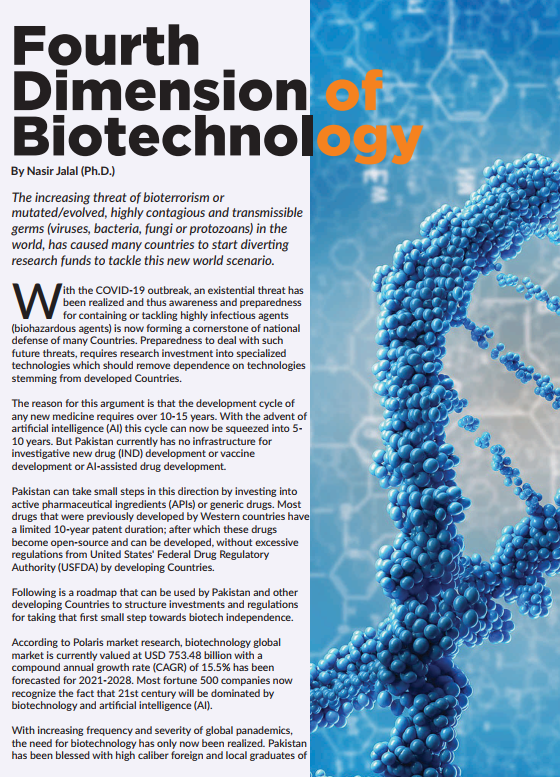
The increasing threat of bioterrorism or mutated/evolved, highly contagious and transmissible germs (viruses, bacteria, fungi or protozoans) in the world, has caused many countries to start diverting research funds to tackle this new world scenario.
By Nasir Jalal (Ph.D.)
With the COVID-19 outbreak, an existential threat has been realized and thus awareness and preparedness for containing or tackling highly infectious agents (biohazardous agents) is now forming a cornerstone of national defense of many Countries. Preparedness to deal with such future threats, requires research investment into specialized technologies which should remove dependence on technologies stemming from developed Countries.
The reason for this argument is that the development cycle of any new medicine requires over 10-15 years. With the advent of artificial intelligence (AI) this cycle can now be squeezed into 5-10 years. But Pakistan currently has no infrastructure for investigative new drug (IND) development or vaccine development or AI-assisted drug development.
Pakistan can take small steps in this direction by investing into active pharmaceutical ingredients (APIs) or generic drugs. Most drugs that were previously developed by Western countries have a limited 10-year patent duration; after which these drugs become open-source and can be developed, without excessive regulations from United States’ Federal Drug Regulatory Authority (USFDA) by developing Countries.
Pakistan has a pool of over 14000 biotech graduates who are formally trained in research but following University graduation have NOT been engaged in any research, development or commercialization of useful biotechnologies.
Following is a roadmap that can be used by Pakistan and other developing Countries to structure investments and regulations for taking that first small step towards biotech independence.
According to Polaris market research, biotechnology global market is currently valued at USD 753.48 billion with a compound annual growth rate (CAGR) of 15.5% has been forecasted for 2021-2028. Most fortune 500 companies now recognize the fact that 21st century will be dominated by biotechnology and artificial intelligence (AI).
With increasing frequency and severity of global pandemics, the need for biotechnology has only now been realized. Pakistan has been blessed with high caliber foreign and local graduates of biotechnology, who, if organized into a workforce with set goals, can be effectively utilized to develop many products locally and reduce the pressure on trade deficit with US and Europe.
Most of the Pakistani scientists work in isolation and in an extreme dearth of funds. Biotechnology research is one of the most expensive research fields in the world with slow progress.
Pakistan has a pool of over 14000 biotech graduates who are formally trained in research but following University graduation have NOT been engaged in any research, development or commercialization of useful biotechnologies. With such a large number of highly skilled human capital, Pakistan can utilize their expertise to indigenize several biotechnology products and save billions in foreign exchange through import substitution.
A biotechnology policy, per se, was formulated in 2014 by the Ministry of National Food Security and Research (MNFSR) http://www.mnfsr.gov.pk/userfiles1/file/National%20Food%20Security%20Policy%20%202018%20(1).pdf, but its scope was limited to agriculture alone. Pakistan needs to review and revise this policy with a wider scope to include diverse fields of research, such as pharmaceuticals, health, and any other biotechnologies that could help in food, water or energy security.
This article provides possible avenues that build on the original policy of MNFSR and makes it more inclusive and comprehensive. The revised policy must reposition the field of biotechnology into a major segment of Pakistan’s growing economy through removal of constraints in the process of biotech product development, import substitution, commercialization and creation of an enabling environment through social, technical, economic, environmental, political and value (STEEPV) related issues.
Water security for Sind and Baluchistan can attract academic researchers that can develop cost-effective technologies for sea-water filtration to make it potable.
Being multifarious, biotechnologies cannot be entirely placed under the purview of Drug Regulatory Authority of Pakistan (DRAP), e.g., dehairing of animal hides using protease enzyme should be regulated by a specialized body (National Biotechnology Commission) placed under the ministry of science and technology (MoST) and not DRAP directly; however, the development of a new drug or API can still be regulated by DRAP. Such gray areas have until now been overlooked, not giving MoST the opportunity to properly regulate such locally developed biotechnology commercial products.
Revised biotechnology policy objectives
The set goals of revision of the current national biotechnology policy must be founded in certain quantifiable objectives which must first, reduce the national unemployment rate as well as develop a biotechnology-based economy. Second, any biotechnology products must be regulated under the national biotechnology commission and third, an export promotion segment must be stimulated to capture markets overseas. Here is a list of specific objectives that the revised biotechnology policy must consider;
- Enhance employment/business opportunities for highly skilled biotech graduates of Pakistan.
- Create an online registration portal for Biotechnology graduates of Pakistan, and this portal linked with the HEC’s database.
- Organize the highly skilled human capital, trained in biotech research, to develop new biotechnologies for the country.
- Identify biotechnologies unrelated to human or animal health that may not be regulated by DRAP.
- Prepare a grouped list of such indigenous and imported biotechnologies and group them into five large subcategories i.e., (i) applied microbial, stem cell and regenerative biotechnology, (ii) biotech in drug development and pharmaceuticals, (iii) biotech in diagnostics and medical devices, (iv) biotechnology in food processing, agriculture, livestock, environmental protection or bioremediation (v) biotechnology in renewable energy, astrobiology, space medicine or any other field.
- Ensure that these biotechnologies are sustainable and do not harm the environment or destroy natural habitats.
- National agriculture research council (NARC) under MNFSR may continue regulating agricultural biotechnologies but empower the National Biotechnology Commission (NBC), budgeted by MoST to regulate non-agricultural biotechnologies.
- Propose fast and easy, quality assurance processes and measures to facilitate local inventors and biotechnologists to register and commercialize their technologies.
- Develop checks, balances and countermeasures to prevent corruption or misuse of biotechnologies.
- Identify policy disconnect amongst relevant ministries and regulatory bodies to remove roadblocks in the way of technology registration, approvals and commercialization.
- Protection of copyrights of ownership by linking National Biotechnology Commission (NBC) with intellectual property office (IPO) office to regulate intellectual properties of local biotech inventors.
- Adoption of presentation, practice and production (PPP) format to help build an engine of biotechnology incubation parks in all provinces of Pakistan and link them with local academic institutions of research.
- Equip biotechnology parks with state-of-the-art biotech tools and analytical equipment (such as NMR, mass spectrometry, HPLCs, flow cytometry, stem cell extraction, synthetic Chemistry labs to develop APIs, pre-clinical testing labs for testing the APIs and then establishing a set up for phase 1-4 clinical trials) to create an ecosystem of innovation, growth and commercialization of biotechnologies.
- Develop a qualifier contract for housing, maturation and exit strategy for biotechnology graduates that may be housed in the biotechnology incubation parks.
Besides these policy objectives, we must also strengthen the existing system of academic research and researchers. Most of the Pakistani scientists work in isolation and in an extreme dearth of funds. Biotechnology research is one of the most expensive research fields in the world with slow progress.
While Higher education commission (HEC), Pakistan science foundation (PSF) and few other agencies provide funds for research, but the success rate, frequency and total volume of funds is usually not enough to complete expensive research projects. There is a lot of room for funding agencies to expand their goals vis-à-vis biotechnology research in Pakistan, but such expansion can be themed to achieve a certain objective.
For instance, water security for Sind and Baluchistan can attract academic researchers that can develop cost-effective technologies for sea-water filtration to make it potable. Similarly, another theme could fund research into development of APIs through synthetic chemistry and its pre-clinical testing via pharmacologists and toxicologists.
If Pakistan continues to rely on foreign countries for such drugs, we remain dependent and lose billions of dollars annually, while losing an even more precious resource of highly skilled manpower to other countries.
Currently most of Pakistani Pharmaceutical companies import salts and package them for marketing, with zero research into developing our own active pharma ingredients. Government’s attention into this field of indigenization can alone save billions of dollars’ worth of precious foreign exchange, which can at the same time bring down costs of medicine for the end-user. Most of the generic drugs, if developed through this stream of API indigenization, would bring down the cost of an insulin injection from its current cost of PKR 600 to 200 or even lower.
Dealing with emergent new diseases and resistant bacterial strains will require a continual effort of new drug development. If Pakistan continues to rely on foreign countries for such drugs, we remain dependent and lose billions of dollars annually, while losing an even more precious resource of highly skilled manpower to other countries. Within the next 5-10 years Pakistan is expected to face extreme drought due to global warming, resulting in water and food shortage.
We have already faced reduction of cotton crop harvest, due to its excessive water requirement, besides its vulnerability to diseases. This crop can be easily replaced with cannabis, which requires almost no irrigation, is naturally disease resistant and provides a fiber that is 20 times stronger than cotton. Working hard is one thing but it is high time, that we must learn to work smart.

The writer is an academic researcher in the field of Pharmacology and Toxicology.


